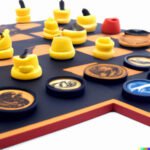Classic family board games have been a staple in households across the UK for generations, providing hours of entertainment and bonding for families. From Monopoly to Scrabble, these timeless games hold a special place in the hearts of many. In this article, we will delve into the history, benefits, and popularity of classic family board games in the UK, as well as provide tips for hosting game nights and teaching these games to new generations.
The allure of classic family board games lies in their ability to bring people together and provide wholesome entertainment that transcends age and time. Whether it’s a rainy afternoon or a cozy evening by the fireplace, these games have been a source of joy and laughter for families across the country. They offer a break from technology and screen time, allowing for genuine human interaction and connection.
Throughout this article, we will take a closer look at the origins of classic family board games in the UK, exploring how they have become ingrained in British culture. We will also discuss the numerous benefits of playing these games, including their educational value for children, social aspects for all ages, and cognitive stimulation.
Additionally, we will highlight some of the top classic family board games that continue to be beloved by households in the UK. So join us on this journey as we celebrate the enduring appeal of classic family board games in British homes.
History of Classic Family Board Games in the UK
The history of classic family board games in the UK is a rich and fascinating tale that dates back centuries. Traditional board games have been a staple in British households for generations, providing entertainment, social interaction, and educational value. The origins of these timeless games can be traced to ancient civilizations such as the Egyptians, Greeks, and Romans, who developed early versions of popular board games like Chess and Backgammon.
In the UK, the popularity of classic family board games skyrocketed during the 20th century, with iconic titles like Monopoly, Scrabble, and Clue becoming household names. These beloved games not only provided hours of fun for families but also served as bonding activities that brought loved ones together. As technology advanced and video games gained popularity, classic board games remained a staple in many homes, serving as a nostalgic reminder of simpler times.
The enduring appeal of traditional board games lies in their ability to transcend generations, bringing people of all ages together to engage in friendly competition and shared experiences. Today, many classic family board games continue to thrive in the UK, with modernized versions and new editions keeping the tradition alive. As we look back on the history of these beloved pastimes, we can appreciate the cultural significance and lasting impact they have had on British society.
| Classic Board Game | Year Released |
|---|---|
| Monopoly | 1935 |
| Scrabble | 1948 |
| Clue (Cluedo) | 1949 |
| Battleship | 1967 |
Benefits of Playing Classic Family Board Games
Playing classic family board games offers many benefits beyond just entertainment. These timeless games provide educational, social, and cognitive advantages that make them a valuable addition to any family’s leisure activities. Here are some of the key benefits of playing classic family board games:
- Educational Benefits: Many classic board games involve strategy, critical thinking, and decision-making skills. Games like Scrabble can improve vocabulary and spelling, while Monopoly teaches financial literacy and arithmetic.
- Social Benefits: Board games provide an opportunity for quality bonding time with family members and friends. They encourage communication, cooperation, and sportsmanship, fostering strong relationships and creating lasting memories.
- Cognitive Benefits: Playing board games can enhance cognitive functions such as memory, attention to detail, and problem-solving abilities. They stimulate the brain and provide mental stimulation in a fun and engaging way.
In addition to these specific benefits, classic family board games also promote overall well-being by reducing stress, improving mood, and providing a break from screen time. With their ability to entertain, educate, and bring people together, it’s no wonder that these timeless games continue to be cherished by families across the UK.
Top 5 Classic Family Board Games in the UK
When it comes to classic family board games in the UK, there are a few beloved titles that have stood the test of time and continue to be crowd favorites in British households. These games not only provide hours of entertainment but also promote bonding and friendly competition among family members. Here are the top 5 classic family board games that have been enjoyed by generations in the UK:
- Monopoly: This iconic real estate trading game has been a staple in British homes since its introduction in the early 20th century. Players buy, sell, and trade properties to build their real estate empire while trying to bankrupt their opponents.
- Cluedo: Known as Clue in North America, this murder mystery game challenges players to solve a crime by deducing the suspect, weapon, and location of the murder. With its suspenseful gameplay and intricate storyline, Cluedo has remained a favorite among mystery enthusiasts.
- Scrabble: A word game that tests players’ vocabulary and strategic skills, Scrabble is a classic board game that has been enjoyed by families across the UK. Players form words on the game board using letter tiles and compete for high scores.
- Trivial Pursuit: This trivia-based board game covers a wide range of categories such as history, science, arts, entertainment, sports, and more. Players move around the board answering questions to collect wedges from each category, aiming to be the first to complete their pie-shaped playing piece.
- Battleship: A naval combat game that requires strategic thinking and intuition, Battleship remains popular among families in the UK. Players take turns guessing coordinates on a grid to locate and sink their opponent’s fleet of ships.
These classic family board games have not only provided entertainment but have also brought families together for memorable bonding experiences over generations. Whether it’s buying properties in Monopoly or constructing complex words in Scrabble, these timeless games continue to hold a special place in British households.
Tips for Hosting a Classic Board Game Night
Hosting a classic board game night can be a fun and rewarding experience for the whole family. To ensure that the event is enjoyable and successful, there are several tips and practical advice that can be taken into consideration. First and foremost, it is important to select a variety of games that cater to different age groups and preferences. This will ensure that everyone has a game they enjoy and can actively participate in.
In addition, it is essential to create a welcoming and comfortable environment for game night. Set up an area with ample seating, good lighting, and a clear playing surface. Providing snacks and refreshments can also enhance the overall experience for everyone involved. Furthermore, establishing ground rules for respectful gameplay and sportsmanship will help maintain a positive atmosphere throughout the evening.
Lastly, planning out the logistics of the event is crucial for its success. Consider factors such as timing, duration, and potential breaks in between games. It may also be helpful to have someone designated as the game master or facilitator to keep things running smoothly. By taking these tips into account, hosting a classic board game night can become a memorable and enjoyable tradition for the whole family.
| Tips | Details |
|---|---|
| Select Games | Choose games suitable for all ages |
| Create Comfortable Environment | Set up seating, lighting, clear playing surface |
| Plan Logistics | Consider timing, duration, breaks between games |
How to Teach Classic Family Board Games to New Generations
Introducing classic family board games to younger generations can be a rewarding experience that fosters bonding and creates lasting memories. However, it’s essential to approach this task with creativity and patience, considering the different interests and attention spans of children and young family members.
Choose Age-Appropriate Games
When introducing traditional board games to new generations, it’s crucial to select games that are suitable for the age and developmental stage of the children. Younger kids may enjoy simple games that involve counting, matching, or memory skills, while older children can handle more complex strategic games. By choosing age-appropriate games, you can ensure that the experience is enjoyable and engaging for everyone involved.
Make Learning Fun
Teaching classic family board games to new generations should be approached as an opportunity for fun and learning. Incorporate interactive elements into the teaching process, such as using colorful game pieces, lively storytelling, or incorporating educational aspects into gameplay. By making the learning process enjoyable, children will be more likely to embrace these traditional games and look forward to playing them with the family.
Be a Patient Guide
Introducing new generations to classic family board games requires patience and understanding. Children may need time to grasp the rules and strategies of these games, so it’s important for adults to serve as patient guides throughout the learning process. Encourage questions, provide gentle guidance, and celebrate small victories to keep children motivated and eager to continue playing these timeless classics with their family members.
The Future of Classic Family Board Games in the UK
In conclusion, classic family board games continue to hold a special place in the hearts of UK households, providing endless hours of entertainment and bonding opportunities for families. Despite the rise of digital entertainment, the timeless appeal of traditional board games remains strong, with many families continuing to embrace these games as a means of wholesome and engaging recreation.
The enduring popularity of classic family board games in the UK reflects their ability to bring people together, encourage friendly competition, and create lasting memories.
As we look to the future, it is clear that classic family board games will continue to evolve and adapt to modern lifestyles. While the traditional versions of these games remain beloved by many, we can also expect to see technological advancements influencing how these games are played.
From online versions of classic board games to interactive adaptations that incorporate digital elements, the potential for innovation is vast. Additionally, efforts to keep these games relevant and appealing to younger generations will be essential in ensuring their continued success.
Ultimately, the future of classic family board games in the UK looks bright as these timeless pastimes continue to withstand the test of time. With their numerous benefits for social bonding, cognitive development, and simple enjoyment, it is likely that classic board games will remain a staple in British households for years to come. Whether enjoyed in their original form or through innovative adaptations, these games are poised to maintain their status as cherished fixtures in family recreation.
Frequently Asked Questions
What Are 5 Classic Family Games?
Five classic family games include Monopoly, Scrabble, Clue, Sorry!, and Pictionary. These games have been enjoyed by families for generations and often involve strategy, creativity, and problem-solving skills.
What Is the Most Popular Board Games for Adults UK?
The most popular board game for adults in the UK is likely to be games like Ticket to Ride, Catan, Carcassonne, or Pandemic. These strategy-based board games have gained popularity among adults due to their complex gameplay and ability to engage players in immersive experiences.
What Is the Most Popular Traditional Board Game?
The most popular traditional board game is chess. This timeless game has been played for centuries and continues to be a favorite among people of all ages around the world. Chess requires critical thinking, strategic planning, and patience, making it a beloved traditional board game option.

I love playing all kinds of games – from classics like Monopoly to modern favourites like Ticket to Ride.
I created this blog as a way to share my love of board games with others, and provide information on the latest releases and news in the industry.





